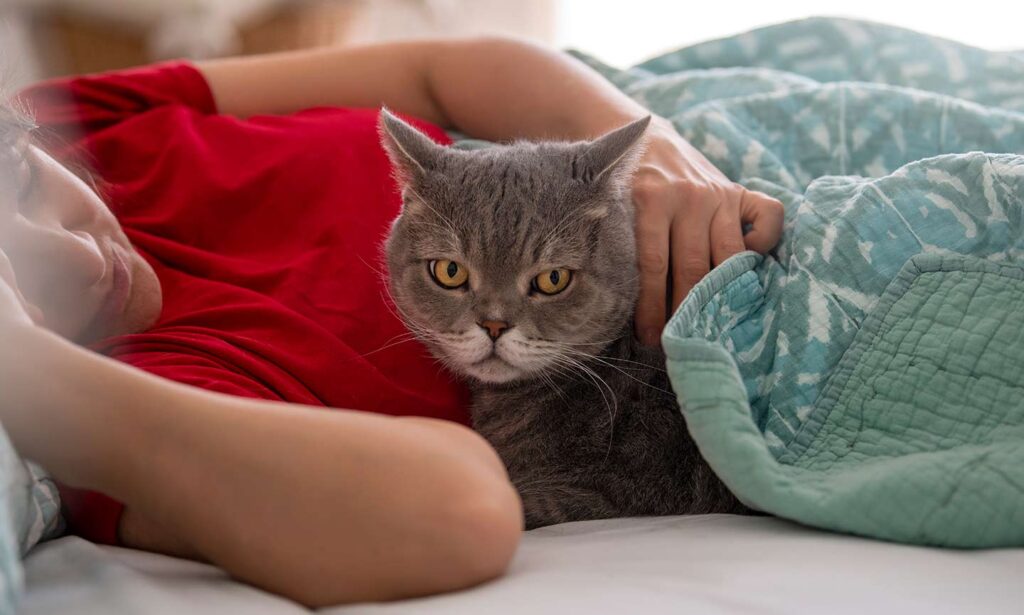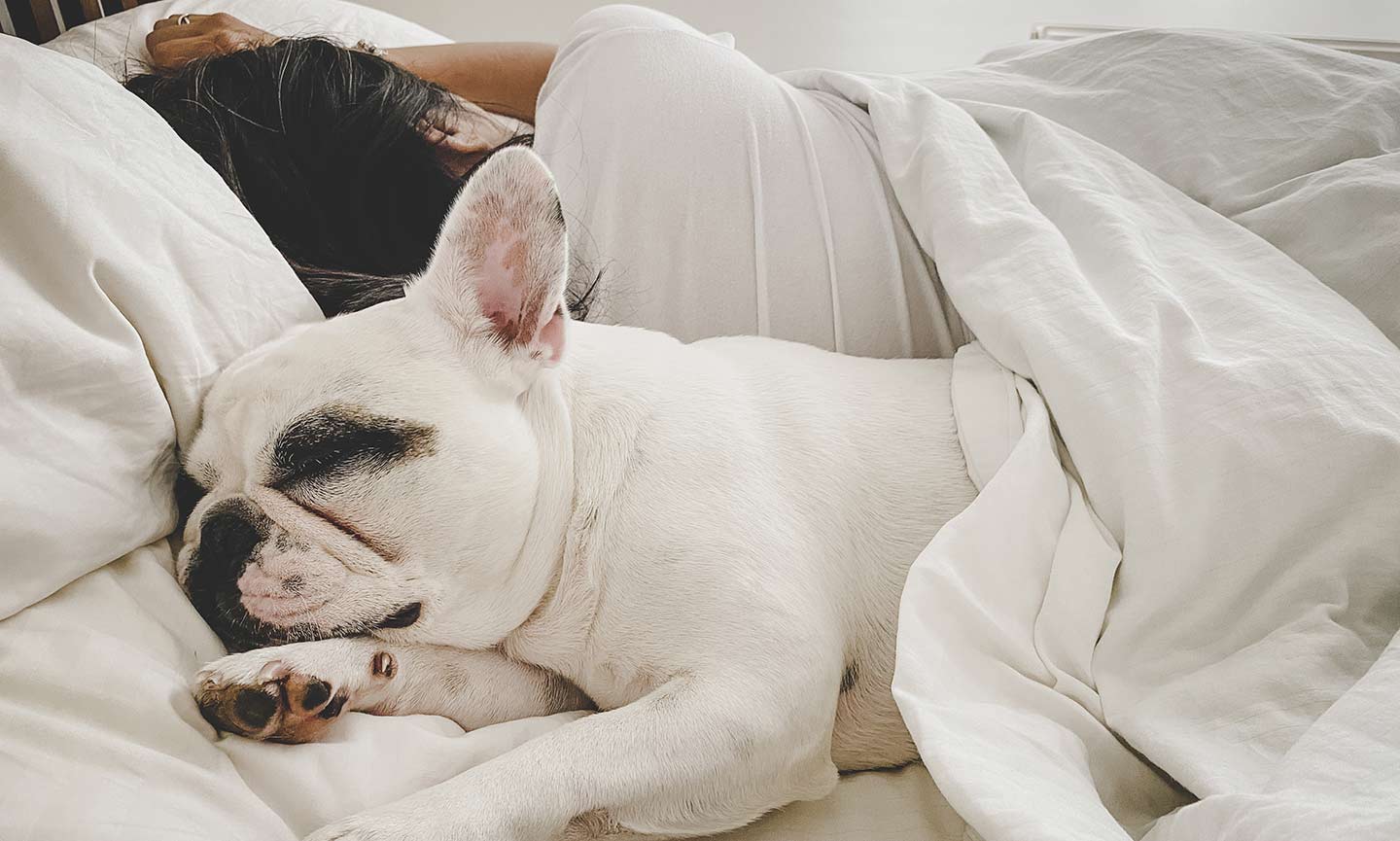Does Daylight Saving Time Affect Pets? 8 Tips To Help Them Adjust

Photo by Getty Images/101cats
From waking up wide-eyed for a “w-a-l-k” an hour early to howling as if they’re a professional opera singer at a pitch-black 5 p.m., it’s no secret that pets can sometimes frustrate their parents when the time changes from standard time to daylight saving time (DST). But even as we humans try to adapt to “spring forward, fall back,” it’s only natural that our furry companions may have some challenges with the change in schedule. (And honestly, who can’t relate to that?) So, how can you help your pet navigate the adjustment? We talked to vets to find out.
Does DST Affect Pets?
For some people, turning the clocks may mean excessive sleepiness and sleep deprivation during the spring and (finally) feeling well-rested once fall comes around. Either way, it can take some time before the body adjusts to the shift in daylight hours. But does this twice-yearly ritual actually affect our furry friends, too?
Dr. Bethany Hsia, DVM and co-founder of animal end-of-life care network CodaPet, says daylight saving time change can indeed have an impact on our pets. While they may not be directly affected by the concept of time itself, she says the changes in our daily routines and schedules can have an indirect effect on their behavior and well-being.
For example, dogs’ and cats’ circadian rhythms, or their body’s internal clocks, are considered to be naturally crepuscular, meaning they are most active at dawn and dusk—but they can also adjust to different sleep schedules. Domesticated dogs tend to follow their pet parents’ sleep schedules, leaning toward being diurnal, where they sleep at night and are awake during the day just like us.
A study on sleep in dogs published in 2020 hypothesized this activity may reflect how our canine companions have adapted to our sleep schedules since domestication. It also found that dogs have a weaker circadian regulation with naturally shorter and more frequent sleep-wake cycles. Because of these differences when compared to humans’ circadian rhythms, dogs have greater flexibility in their sleep schedules and are more capable of adjusting to changes in routine.
But though our pets are highly adaptable, they’re at their best when they have an idea of what the day holds.
“Pets are creatures of habit and rely on a consistent schedule for their meals,” Dr. Hsia says. “When the clocks change due to daylight saving, their internal clock may not immediately adjust to the new feeding times.”
This can lead to confusion and hunger, causing your pet to exhibit behaviors like begging for food or becoming anxious, she adds.
Just as we adjust to “losing” an hour or “gaining” an extra hour of sleep, the time shift can also disrupt our pets’ sleep patterns.
“Pets often have a keen sense of when it’s time to sleep or wake up based on external cues, like daylight,” Dr. Hsia says. “When the clocks change, these cues may no longer align with their internal clock, leading to confusion and potential sleep disturbances.”
After moving the clock forward or backward, Dr. Hsia says pet parents should anticipate certain behavioral changes in their pets and plan accordingly. Some common behaviors may include anxiety, hunger and sleep disturbances—and understandably so.
Drastic changes in routine may lead to our pets feeling especially stressed. After all, they’ve become accustomed to knowing what to expect every day.
Signs of stress in pets may appear as:
- Loss of appetite
- Panting
- Changes in stool production
- Excessive grooming or shedding
- Excessive clinginess or avoidance
- Excessive vocalizing
- Increased sleeping
- Destructive behavior
- Potty accidents in the house
Fortunately, making slight changes can make a big difference to your pet.

Getty Images/gollykim
How To Help Your Pet Adjust to the Time Change
As much as we wish we could verbally explain to our pets why it seems that breakfast is later or bedtime is earlier than usual and have them understand, there are other ways we can help them adjust their body’s clock to the time change.
“One of the many reasons dogs are so loved and remarkable is because, unlike people that get stuck in their ways and have difficulty, a dog is much more flexible and adaptable and will change with relative ease” when it comes to DST, says Russell Hartstein, CDBC, CPDT-KA, and founder of Fun Paw Care dog training. He adds that not only dogs, but cats too are often “very adaptable” and can change quickly with your schedule.
To help your canine or kitty companion adjust to daylight saving time, our experts recommend these tips:
- Plan ahead and provide them with a calm, secure environment to help alleviate their anxiety. A comfortable and quiet sleeping environment may help regulate their sleep patterns.
- Gradually adjust their mealtimes to align with the new time so they aren’t begging for food. Alternatively, you can continue to feed your pet at the time-adjusted schedule they were previously getting their food. “If you have a pet who is sure you are starving them (!), then feed a small meal at the usual time and then the rest at the new normal time,” says Petrina Firth, CSAT, CAB, APDT, CAPBT, also known as “The Pet Coach.”
- Make slight adjustments in their exercise and bedtime routines, too. “Instead of abruptly changing their schedule, gradually shift it by 15 minutes each day leading up to the time change,” Dr. Hsia explains. “This will help their internal clock adjust more smoothly.”
- Engage them in mentally stimulating activities, such as interactive games, puzzle toys or training sessions. This will help tire them out mentally and physically, promoting better sleep and reducing anxiety.
- Go to bed early. That way, if your pet wakes up early, you’ll at least have had a good amount of time to sleep yourself.
- Use an alarm clock to get them to understand “now is the time we wake up,” as these environmental cues are easy for a dog to understand. Adjust your wakeup time by just 10 minutes each morning, and you’ll soon be waking up at your new, normal time—making the transition easier for both you and your pet!
Because our pets thrive with routine, they’ll be able to pick up on this new schedule as long as we’re consistent in giving them an idea of what to expect on a regular basis.
Is Melatonin Safe for Pets?
When people have trouble sleeping, they may reach for melatonin. Generally speaking, melatonin is also considered safe for pets, including both dogs and cats, says Dr. Sara Ochoa, DVM, a veterinarian at Animal Hospital of West Monroe in West Monroe, Louisiana, and the co-founder of How To Pets.
“Melatonin is deemed safe for pets due to its natural occurrence in their bodies,” she says. “Any administered supplement serves merely to aid natural functionality within the pet’s system. This hormone helps regulate sleep patterns, reduce anxiety and manage other conditions, such as Cushing’s disease in dogs.”
Before giving melatonin to your pet, Dr. Ochoa shares the following safety tips:
- Consult your veterinarian to determine if melatonin is appropriate and safe for your pet.
- Administer the correct dosage of melatonin specifically formulated for pets as recommended by your vet based on their species, size and individual needs.
- Before using melatonin for humans, be sure to get the OK from your vet and double-check the ingredients to ensure that it doesn’t contain xylitol, a sugar substitute, as it’s toxic to dogs and should be avoided at all costs.
- Be aware of possible side effects, such as mild sedation, digestive upset or increased heart rate. If you notice any unusual or severe reactions in your pet, discontinue the use of melatonin and consult your veterinarian immediately.
- Regularly monitor your pet’s behavior. As you start giving melatonin to your pet, it’s vital to keep an eye on any changes to their sleep cycles/patterns, anxiety levels and overall well-being.
- Melatonin is often recommended for short-term use. Extended use should be discussed with your vet to ensure it remains safe and effective for your pet’s health.
- As with any medication, store melatonin out of your pet’s reach in a secure location to prevent accidental ingestion.
Alternatives to giving your pet melatonin include:
- Prescription medications for anxiety, such as trazodone, fluoxetine and clomipramine
- Over-the-counter supplements, such as L-theanine and chamomile
- Behavioral approaches, like regular training and socializing, adequate physical activity and creating a quiet, safe space to reduce stress levels
Consult your pet’s veterinarian to determine what might be the most suitable option for a good night’s sleep based on their individual needs.
The Takeaway
While pets don’t know what daylight saving time is, they do know when there’s a change in their daily routine (especially if it affects their mealtimes). Since sudden, major changes can be stressful to pets, it’s best to make gradual adjustments to their sleep schedule or exercise routine to help them welcome autumn or spring with ease. If you notice your pet is struggling to get some shut-eye, consult your vet to learn whether you can give them melatonin or try other wellness tips to help them sleep soundly.



